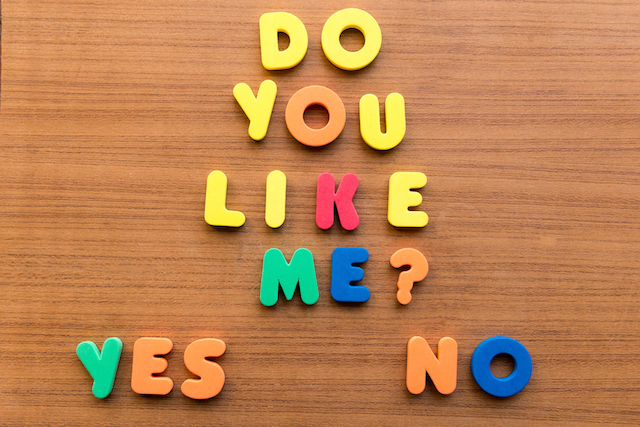10 Reasons to be Okay with Being Disliked

“If your number one goal is to make sure that everyone likes and approves of you, then you risk sacrificing your uniqueness, and, therefore, your excellence.” ~Unknown
We all know at least one hardcore people pleaser. You know the signs: She sleeps out in the rain and gets sick so her friend's dog can fit in the tent. She's 100 percent Republican but pretends she’s Democrat solely because her friends are.
If a friend calls her stupid, she whips up a batch of cookies and makes a card that reads, “I'm sorry for disappointing you.” And despite all her efforts to be liked by everyone, many people disrespect her.
Maybe that's you, maybe it's not—but odds are, you can relate at least a little to the desire to be well-liked. Who doesn't want to feel accepted, respected, and appreciated?
For most of my life, my need to be liked overshadowed all my other needs. I was always trying to manipulate perception, adapting myself to receive validation. It was draining and counterproductive, since very few people actually knew me—the real me—which is a prerequisite to liking me.
I've since learned it's actually a good sign if there are some people who don't accept or agree with me.
I'm not suggesting we should be rude, inconsiderate, or disrespectful. This post isn't about disregarding other people's feelings.
This is about releasing our stress about other people's opinions.
When you’re comfortable not being liked by everyone:
1. It allows you to be true to yourself.
The biggest disservice you can do yourself is shapeshifting to please your “audience” of the moment. It's exhausting (even to watch) and, more importantly, pointless. No one will get to know who you really are, which will leave you feeling empty.
2. It gives you the power to say no.
I believe people are good at heart. Still, it’s human nature to test each other’s boundaries. When you're willing to risk being disliked, you're able to say no when you need to. Your yeses and nos shapes your future, so choose them wisely.
3. You're more comfortable exploring your feelings.
Doesn't it feel good to just be where you are without pretending for someone else's sake? I'm not saying you should act in anger or fear, just that it's pretty exhilarating to say, “Hell yeah—I'm terrified” (or lonely or weak or struggling) regardless of what people will think.
4. Your candor can help other people.
An angst-filled younger me made a fake voodoo doll for a middle school teacher who was hard on me, but forever changed my life (not my proudest moment). It's often the least popular people who strike the deepest chord in us. Be unpopular when necessary and push people to be their best. You just may save someone's life.
5. You can freely express your thoughts.
One of the kindest things you can do for someone else is listen without judging. You deserve that same kindness, but you won't always get it. People will form opinions as you speak. Talk anyway. Let your words be kind but fearless.
6. It prepares you for greater success.
Pick a popular Twitter user and look at their @replies. Odds are they field their fair share of harsh comments. The higher you rise, the more attention you'll receive, both positive and negative. A willingness to be disliked helps you deal with the added scrutiny.
7. It teaches you to offer kindness and compassion without expectations.
It's not difficult to offer compassion to someone who treats you with respect and kindness. What's more valuable for your personal development, and to humanity as whole, is the ability to do what's right because it's right—not because you get something in return.
8. You can inspire other people.
There is someone I know who has the uncanny ability to keep going even when others try to pull her down. I learn from her every day. To this woman, anyone who doesn't appreciate her assertive, over-the-top personality is a reminder that she is unique and unafraid.
9. You can use your time wisely.
If you want to be liked by everyone, odds are you're spreading yourself way too thin trying to keep them all happy. We need to use our time judiciously to enrich ourselves and others instead of worrying about everyone’s perceptions.
10. You can choose to smile anyway.
You could use your energy to make daily inventories of everything that's wrong—the money you don't have, the esteem you didn't earn, the people you disappointed. Or you could commit to being your best, and then just sit back and smile. Life will always be a balancing act. Learn to teeter in serenity.
Do you like me image via Shutterstock










